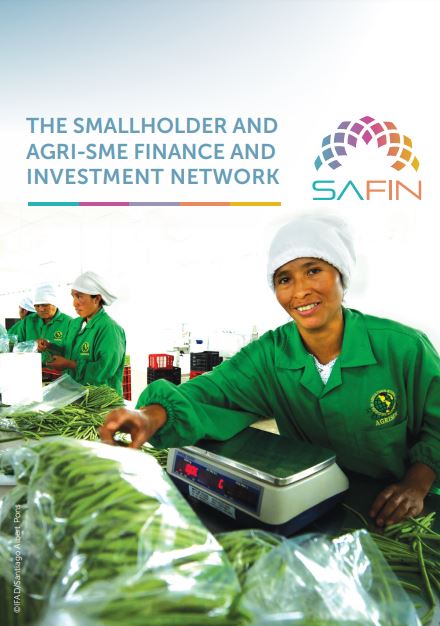watch the recording here
- How do you as an Agri SME know what the requirements are of the financiers you want to approach?
- How do you as a BDS provider know what technical assistance to provide when you are supporting an MSME to become ‘bankable’?
- How do you as a lender know how to assess risk and streamline your selection process?
Marise Blom - Chief Operating Officer, SCOPEinsight
Resource:AGRA (2021) Mobilizing Agricultural Finance Toward a Common Language Between Lendersand Agri-SMEs in Sub-Saharan Africa
In recognition of the need to narrow
this finance gap, the Center for Financial
Inclusion (CFI) and SCOPEinsight, in
partnership with the Alliance for a Green
Revolution in Africa (AGRA), worked to create
a standardized set of bankability metrics that
can serve as a common language between
lenders and agri-SMEs.
- Lenders can use the metrics to gain a clear overview of the state of an agri-SME’s business that is robust enough for the lender to make an informed decision of whether to continue with due diligence, reducing the amount of time it takes to conduct a pre-screening and initial assessment.
- In addition, agri-SMEs and the service providers that support them can use the metrics to understand the expectations of lenders, so they can better prepare for the financing assessments.
The partnership wants to create market transparency that is needed to unlock financing for agri-SMEs in emerging markets.
The SME Resource Bank contains fundraising materials such as:
Contributing partners to the Resource Bank include USAID, U.S. International Development Finance Corporation, Prosper Africa, GiZ, IFC and CrossBoundary. The Agribusiness Deal Room is delivered by a consortium of partners namely: AECF, AfDB, AGRA, Bonrezo, CASA, CrossBoundary Group, GAIN, Grow Africa, Generation Africa, IDH, IFC, IFAD, KPMG, Rockefeller Foundation, SAFIN, Tanager, Blair Institute for global change, USAID and the World Economic Forum. The Deal Room is hosted annually at the African Green Revolution Forum (AGRF) which is hosted by AGRF partners and the Government of Rwanda.
The Smallholder and Agri-SME Finance and Investment Network (SAFIN) is a partnership of actors that are committed to aligning their efforts to scale up access to financial services for agri-SMEs and for small commercial farms.
- Agricultural small and medium enterprises (agri-SMEs) face complex and persistent challenges in emerging markets, despite the vital role they play in these economies.
- On the one hand the agribusinesses do not meet market requirements to attract funding, often because they are not run as businesses. On the other hand, the financiers – which range from local financial institutions, regional lenders, and global investors – find the agricultural sector extremely risky and expensive to service.
- The partnership between MIX and SCOPEinsight addresses this by using data to create transparency, help financiers make more informed decisions, and build a bridge between agri-SMEs and the capital they need to grow. This partnership’s first set of activities is supported by the Alliance for a Green Revolution in Africa (AGRA).
Related:
African agribusiness Small and Medium Enterprises seeking to fundraise for their businesses can now go online and have access to a newly launched platform where they can find articulated requirements for accessing the funds.“The SME Resource Bank, which is now a component of the AgriBusiness Deal Room, is a virtual repository of guiding materials that will help entrepreneurs to better prepare for and optimize their engagements with investors,” Jennifer Baarns, the Head of Partnerships at the Alliance for a Green Revolution in Africa (AGRA).The Agribusiness Deal Room is a matchmaking online platform under the Africa Green Revolution Forum (AGRF), which convenes close to 4,000 stakeholders from the entire eco-system to facilitate partnerships and investments in African agriculture.
The SME Resource Bank contains fundraising materials such as:
- comprehensive investment memos,
- robust financial models and market analysis information that will inform SMEs about the investment process
- and requirements and how to prepare for participation in the Agribusiness Deal Room.
Contributing partners to the Resource Bank include USAID, U.S. International Development Finance Corporation, Prosper Africa, GiZ, IFC and CrossBoundary. The Agribusiness Deal Room is delivered by a consortium of partners namely: AECF, AfDB, AGRA, Bonrezo, CASA, CrossBoundary Group, GAIN, Grow Africa, Generation Africa, IDH, IFC, IFAD, KPMG, Rockefeller Foundation, SAFIN, Tanager, Blair Institute for global change, USAID and the World Economic Forum. The Deal Room is hosted annually at the African Green Revolution Forum (AGRF) which is hosted by AGRF partners and the Government of Rwanda.
The Smallholder and Agri-SME Finance and Investment Network (SAFIN) is a partnership of actors that are committed to aligning their efforts to scale up access to financial services for agri-SMEs and for small commercial farms.
- SAFIN is entering a new phase (SAFIN 2.0) in 2021-2025, following on the success of a three-year pilot.
- During SAFIN 2.0, partners will seek to increase the volume of agri-SME finance they collectively deploy or mobilize, grow the pool of initiatives they undertake jointly or in a coordinated fashion, and continuously share knowledge and learning to improve their respective offerings to SMEs to support their journeys towards growth, sustainability and inclusion.
- As of August 2020, SAFIN includes around 50 partners, some of them networks in their own right. These include farmers’ organizations, development finance institutions, donors and philanthropies, United Nations agencies, social lenders and impact investors, technical agencies, multi-stakeholder industry platforms, and research institutions or think tanks. Partners are located around the world, and many of them have a global or regional mandate, while others operate in specific countries.
- The Secretariat, housed at IFAD, convenes and facilitates the network, led by a Senior Coordinator who is responsible for annual planning, reporting and network representation. The Secretariat maintains a live repository of network knowledge resources and monitors network health, achievements and challenges. A six-member Steering Committee representing the diversity of partners provides oversight on planning and resource management, advises the Secretariat, champions the network and supports resource mobilization.




No comments:
Post a Comment